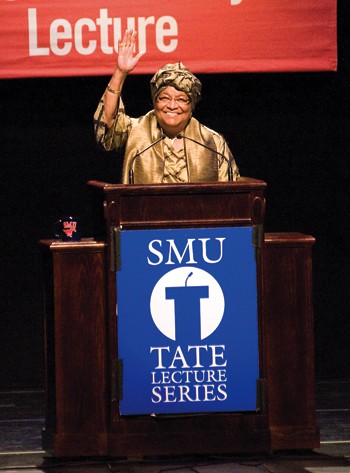
Liberian President Ellen Johnson Sirleaf delivers a speech at the Tate Lecture in McFarlin Auditorium Tuesday night (Stuart Palley)
Her Excellency Ellen Johnson-Sirleaf addressed members of the Dallas and SMU communities Tuesday on her experiences as president of Liberia and as an African woman.
The day’s events began with students and visitors gathering in the Hughes-Trigg Forum for an informal question-and-answer conversation with Johnson-Sirleaf, and concluded with an evening lecture in McFarlin Auditorium. The sold out lecture told the story of one woman’s courage, perseverance and hope in the face of great adversity.
She began the lecture by giving a brief history of her family and life in Liberia. She was born in Monrovia, the capital of Liberia. Her father was born into poverty, and was sent to live in Monrovia to seek a better life. He grew up there and eventually became the first indigenous Liberian to hold a position in the country’s national legislature.
Her mother was also born into poverty, and moved to Monrovia for similar reasons. Johnson-Sirleaf was well educated, and studied in Liberia and in the United States. She studied economics and accounts at the College of West Africa in Monrovia and then moved to America, earning a Master in Public Administration from Harvard.
Politically, Johnson-Sirleaf acted as Finance Minister until resigning over a disagreement on government spending. Years later, when Samuel Doe took control of Liberia, she returned to the country to run against him and support free elections. She was promptly placed under house arrest and exiled from Liberia.
She moved back to Washington, D.C. to serve as Vice President of the African Regional Office of Citibank and of Equator Bank. After Doe was killed by a rebel group, an interim government was put into place. By 1996, free elections were again on the horizon, and she returned to Liberia to participate in the budding political scene.
After more controversy, the interim government and rebel groups signed a peace agreement and held elections for a new head of state. Sirleaf led the Unity Party in the 2005 election, and was declared the winner and the country’s next president.
After giving a brief history of her experiences in Liberia, she mentioned the upcoming establishment of the Bush library, and credited him with helping to push Africa toward democracy. She expressed her thanks for his help in changing African governments, and cited her own as an example.
She also addressed some of the major issues Liberia faces today including: providing adequate social services to all citizens, increasing the payroll of civil servants, overcoming ethnic tensions between native Liberians versus the former slaves that have settled in Liberia, healthcare and the AIDS crisis
Finally, she discussed her nickname as the “Iron Lady of Africa.” She mentioned how other influential women, such as Margaret Thatcher, have been referred to by the same name and was humbled by the recognition, but grateful for the international support of her platforms.








